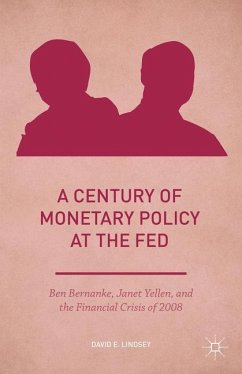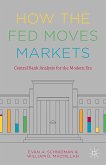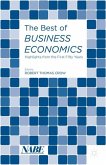A narrative history by a Fed insider of how monetary policy is shaped in the US, with special emphasis on the performances of former Chairman Ben Bernanke and current Chairwoman Janet Yellen in facing the prelude, outbreak, and aftermath of the 2008 financial crisis.
In this narrative history, David E. Lindsey gives the reader a ringside seat to a century of policies at the US Federal Reserve. Alternating between broad historical strokes and deep dives into the significance of monetary issues and developments, Lindsey offers a fascinating look into monetary policymaking from the Fed's inception in 1913 to today.
Lindsey's three decades of service on the Federal Reserve Board staff allow him to combine the heft of scholarship with an insider's perspective on how the recent chairmen's and current chairwoman's personalities and singular visions have shaped policy choices with far-reaching consequences. He critiques the performances of Chairman Ben Bernanke and Vice Chair Janet Yellen during the prelude, outbreak, and aftermath of the financial crisis of 2008, situating them in the context of the Fed's century-long history. He also quantitatively explores an alternative to the conventional New-Keynesian theory of inflation, replacing so-called "rational expectations" with the Fed's inflation objective.
This unique volume is a piece of living history that has much to offer economists and monetary policy and finance professionals.
In this narrative history, David E. Lindsey gives the reader a ringside seat to a century of policies at the US Federal Reserve. Alternating between broad historical strokes and deep dives into the significance of monetary issues and developments, Lindsey offers a fascinating look into monetary policymaking from the Fed's inception in 1913 to today.
Lindsey's three decades of service on the Federal Reserve Board staff allow him to combine the heft of scholarship with an insider's perspective on how the recent chairmen's and current chairwoman's personalities and singular visions have shaped policy choices with far-reaching consequences. He critiques the performances of Chairman Ben Bernanke and Vice Chair Janet Yellen during the prelude, outbreak, and aftermath of the financial crisis of 2008, situating them in the context of the Fed's century-long history. He also quantitatively explores an alternative to the conventional New-Keynesian theory of inflation, replacing so-called "rational expectations" with the Fed's inflation objective.
This unique volume is a piece of living history that has much to offer economists and monetary policy and finance professionals.
"How the Federal Reserve handled the 2008 financial crisis continues to be hotly debated. Here is an outstanding insider's view of the crisis, targeting advanced students of economics. ... Summing Up: Highly recommended. Upper-division undergraduates through faculty." (J. J. Janney, Choice, Vol. 54 (4), December, 2016)








